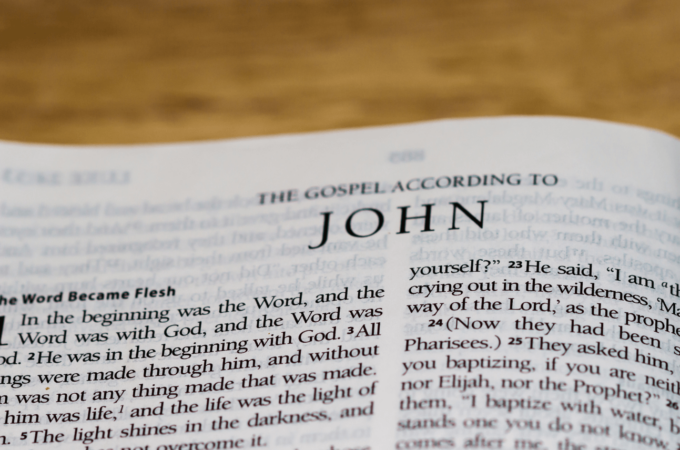The apostle John speaks of Jesus as the “word of God” (John 1:1 emphasis added) and the very “word of life” (1 John 1:1 emphasis added). This word is a translation of the Greek term logos.
John wrote his Gospel not simply to the Jews but to the larger Greco-Roman world, for whom the word logos had a profound meaning. In Greek philosophy, the word logos was used for reason or logic. The Logos brought order and meaning to the universe; it brought cosmos (order) out of chaos. To speak into this Greco-Roman context, rather than a Jewish context, John began his Gospel by identifying the person of Jesus Christ as the Logos of God – the Word of God. He writes:
In the beginning was the [logos], and the [logos] was with God, and the [logos] was God. He was in the beginning with God. All things were made through him, and without him was not any thing made that was made. In him was life, and the life was the light of men. The light shines in the darkness, and the darkness has not overcome it. (John 1:1-5 ESV)
And the [logos] became flesh and dwelt among us, and we have seen his glory, glory as of the only Son from the Father, full of grace and truth. (John 1:14 ESV)
Note that 1) the Word was in the beginning, 2) the Word was God, 3) the Word spoke all things into existence, 4) the Word was life, 5) the Word was light, 6) the Word was the glory, and 7) the Word was full of grace and truth.
 There are intentional and dramatic similarties between John 1:1 and Genesis 1:1. Each narrative begins with the same English phrase: “In the beginning.” The Hebrew word in Genesis is rē(ʾ)·šîṯ, while the Greek word in John is archē. Studying the meaning of each of these words is rewarding, with their translations of “what is first, the beginning” and “initiate an action, process, or state of being; first cause; super-natural power; or simple truth.”
There are intentional and dramatic similarties between John 1:1 and Genesis 1:1. Each narrative begins with the same English phrase: “In the beginning.” The Hebrew word in Genesis is rē(ʾ)·šîṯ, while the Greek word in John is archē. Studying the meaning of each of these words is rewarding, with their translations of “what is first, the beginning” and “initiate an action, process, or state of being; first cause; super-natural power; or simple truth.”
God existed before the beginning, and “in the beginning,” the Creator initiated “the action, process or state of being.” How did God create? First, he imagined the universe as a reflection of his glory. Then, he actualized his thoughts and intentions by speaking words. God spoke the universe into existence (Genesis 1). Jesus was the Logos who spoke the universe into existence (John 1: 1-3). God created cosmos (order) out of chaos.
As Leon Morris writes in his commentary on The Gospel According to John, “The logos was a matter of speaking one’s mind for it was understood that one’s words clearly expressed one’s thoughts and intentions” (Morris 1995, 66).
In the Gospel of John, logos refers to the whole of the Divine nature incarnated in Jesus Christ. We see this also in Hebrews 1:1-2:
Long ago, at many times and in many ways, God spoke to our fathers by the prophets, but in these last days he has spoken to us by his Son, whom he appointed the heir of all things, through whom also he created the world.
The Logos is Jesus, and He is God’s provision for our hearing.
Our team at Disciple Nations Alliance recently had the chance to interview Dr. Brian Chan on our podcast. I thought you might enjoy listening to it here!






